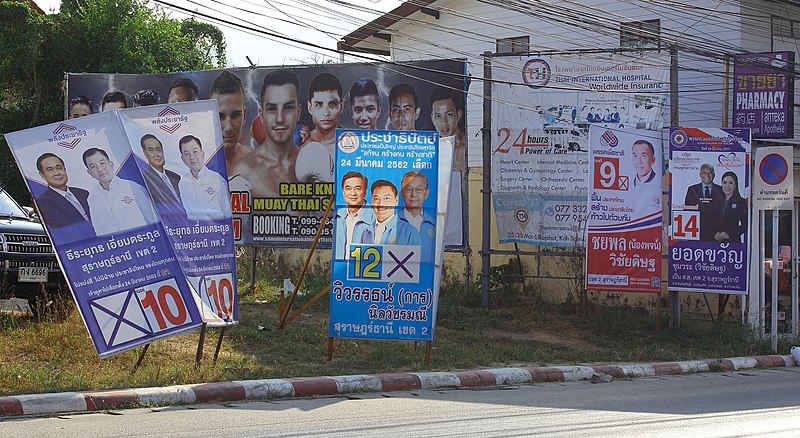
More than a month after Thailand held its first national elections in seven years, official results have been released by the country’s Election Commission, an inherently flawed political institution which has had a key role in boosting the junta’s chances of staying in power.
The election held on 24 March produced several surprises. The pro-military party, Palang Pracharat, was able to attract more votes than the pro-democracy Pheu Thai party. The new Future Forward Party, led by charismatic young billionaire Thanathorn Juangroongrueangkit, came third, beating Thailand’s oldest party, the increasingly unpopular Democrat Party. What’s more, Thailand’s Election Commission said it would not release official results until 9 May.
Officially, this deadline has given the commission time to order by-elections, recount votes and disqualify candidates found to have broken electoral laws.
But the commission is not the impartial actor it claims to be. By design, it’s an institution prone to government manipulation.
The commission was created in 1997, an important year which saw Thailand adopt a new constitution that introduced compulsory voting and several other executive and legislative reforms meant to protect the nation’s democratic development. At its inception, it was hoped an independent and impartial body overseeing the process would help Thailand conduct free and fair elections, consolidating democracy.
But these hopes were short-lived. The commission quickly became a political tool for governments to eliminate political opponents and manipulate election outcomes. As Khemthong Tonsakulrungruang explained in New Mandala, at successive polls, the Election Commission hasn’t been able to dissociate itself from Thailand’s fraught domestic politics.
This was particularly evident in the case of former prime minister Thaksin Shinawatra, who led the country from 2001 until 2006, when a military coup removed him from power. After he was deposed, the junta appointed a new commission committee which actively sought to undermine political parties aligned with him, using Constitutional Court rulings to dissolve three political parties affiliated with Thaksin in 2007.
Today, the commission’s lack of independence is reflected by a series of controversial decisions it’s made. In early March, it dissolved the pro-Thaksin Thai Raksa Chart party after it proposed Princess Ubolratana Rajakanya as its prime ministerial candidate. This, and the commission’s unwillingness to investigate the pro-military Palang Pracharat’s possible campaign violations, indicate that it has protected the junta and bolstered its chances of election success.
It’s been suggested that such failures should not be blamed not on the commission itself but on the junta-drafted constitution, which appeared designed to complicate the election process. Indeed, the 2017 constitution introduced new laws to prevent any political party from getting too many seats in parliament. There has been so much confusion that the commission asked the Constitutional Court if the formula it chose to calculate the allocation of the 350 ‘party-list’ seats in the 500-seat House of Representatives was constitutional.
But the commission was never in a position to organise free and fair elections. All seven commissioners were approved by the National Legislative Assembly in 2018, two of them just months before the election was held. In February last year, the assembly voted down all seven nominations for the commission, with one source claiming the nominees did not have enough experience to organise elections.
There’s more evidence to suggest the commissioners had strong political connections with the junta. The commission’s decision to not rule against current prime minister and former general Prayut Chan-o-cha’s candidacy, even though state officials were not authorised to run as prime ministerial candidates under the 2017 constitution, further reflects its lack of independence. Despite Prayut’s prime ministerial status, his candidacy was accepted by the commission.
The commission has done its best to give the junta the best possible outcome in this election by adopting a formula that has improved the military’s chances of forming a coalition against pro-democracy parties Pheu Thai and Future Forward. Incredibly, small parties that did not even obtain the required number of votes to win a seat have now had a seat allocated to them in the House of Representatives. On top of this, the number of seats allocated to Pheu Thai and Future Forward seems to have been reduced since preliminary election results were announced in late March.
If these official election results are anything to go by, the next few weeks are likely to be a hotly contested period in Thai politics, not least because of the commission’s handling of the election. Although it’s not yet clear who will be able to form government, the junta is still likely to retain power.
Thailand’s political future has partly hinged on a body which lacks the independence or credibility to organise truly democratic elections. Thailand’s flawed Election Commission shows us how vital institutions can be to the conduct of free and fair polls. The Thai experience should serve as a warning for other states that the bodies that are meant to protect democracies can sometimes be manipulated in order to undermine them.

